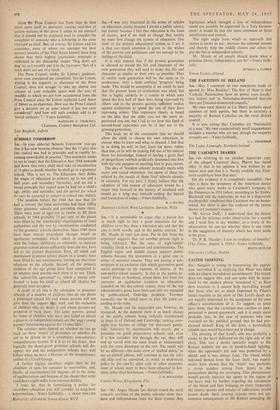SIR,—qt is permissible to argue that a parent has as
much right to buy a good education for his children as to buy them a television set, and that the aim is both worthy and in the public interest.' So Mr. Maude in your last issue. Put in this form the argument suggests that yet another private right is being infringed, But the aura of high-falutin' morality about it is specious and sanctimonious. The English upper and middle classes support public schools because the investment is a good one in terms of material returns. They arc paying a sub- scription to an,exclusive club which guarantees good social pickings—at the expense, of course, of the non-public-school majority. Is this in the public in- terest? Even in Scotland, where there has been for centuries an egalitarian tradition in education, founded on the day-school system, most of the top administrative posts have been and still are occupied by public-school, Oxbridge products. Yea-men naturally can be relied upon to play the game ac- cording to the rules.
Mr. Maude and his supporters can, however, be reassured. At the moment there is as much chance of the public schools being radically transformed as there is of Oxford and Cambridge turning over- night into havens of refuge for distressed gentle- folk. Selection by examination will merely put a premium on good preparatory schools and, even if a few outsiders slip through the net, they will end up tarred with the same brush or whitewashed with the same distemper as the rest. The result will be no different—the same crew of 'stuffed shirts,' to use an Orwell phrase, will continue to run the jolly old ship and be outwitted, as usual, at diplomatic poker by the non-U, alien cads of other countries, most of whom seem to have been educated in hot- spots rather than hot-houses.—Yours faithfully,






























 Previous page
Previous page